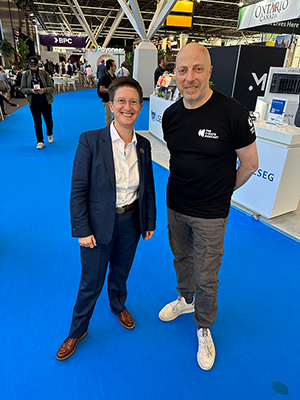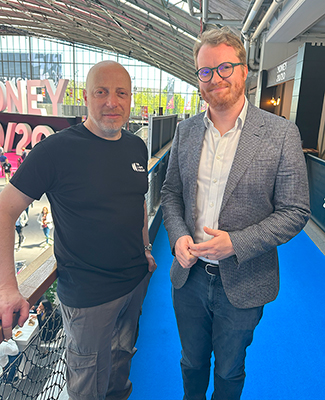Julia Hoggett, CEO, the London Stock Exchange

Julia Hoggett, CEO, the London Stock Exchange, with Russ
Julia Hoggett, is CEO of the London Stock Exchange, and was speaker in a panel on creating dynamism in capital markets. Julia highlighted key points from the panel, which focused on the evolution of the listing regime in the UK, emphasizing the positive changes that will make it easier for fintech companies to list in London. The discussion also covered enhancing research quality for next-generation technology companies, increasing pension investment in equity markets, and the crossover between private and public markets.
Julia explained the significance of having this discussion at Money20/20, recognizing the event as a showcase of the vibrant tech sector and the increasing globalization of the industry, whilst emphasizing that London aims to be a global hub for fintech, with supportive regulators and a strong capital market to meet the financing needs of companies. Julia encouraged listeners to focus on the facts rather than headlines when assessing public markets, highlighting the UK’s leadership in fintech and the strength of London as a financing venue.
Reflecting on Money20/20, Julia expressed her enthusiasm for the sector and its vibrancy, noting the growing presence of not only venture firms but also large institutions exploring how technology can be integrated into their businesses.
Julia believes that the innovation and dynamism in the sector lead to improved services and a better financial ecosystem.
Emma Hagan, Chief Risk and Compliance Officer, ClearBank

Emma Hagan, Chief Risk and Compliance Officer, ClearBank with Romy
Emma Hagan, Chief Risk and Compliance Officer at ClearBank, provided a concise explanation of Banking as a service, which involves the provision of individual banking services by a banking provider to non-financial and financial institutions, often facilitated by aggregators. She highlighted the attention economy as a driving force behind the adoption of Banking as a service, with companies recognising the value of offering financial services within their platforms to capture users’ attention and increase revenues.
The discussion shifted to the concerns surrounding the current governance model of Banking as a service. Emma pointed out that regulatory scrutiny has become a significant factor for fintechs considering Banking as a service, with a substantial number experiencing direct regulatory intervention. The lack of transparency and clarity regarding roles and responsibilities within the Banking as a service ecosystem is a key concern that needs to be addressed.
Emma explained ClearBank’s position within the fintech ecosystem as an embedded banking provider, distinct from traditional Banking as a service. ClearBank offers banking products, particularly accounts, directly embedded into financial institution environments, along with integrated risk and compliance controls.
Looking ahead to the panel session she was involved in, Emma expressed her hope for an agreement on the need for clarity regarding good governance and regulatory standards in Banking as a service. She emphasized the importance of consistency in the market and a forward-looking approach to regulation. Emma also predicted that Banking as a service will continue to grow in the next 12 months, driven by the attention economy and uncertain economic times, and urges regulators to take action to address the regulatory uncertainties in the market.
Additionally, Emma mentioned ClearBank’s partnership with Allica Bank, highlighting ClearBank’s role in providing access to payment rails and account structures through their real-time API cloud technology-based platform. The partnership aims to support Allica Bank in delivering specialised and competitive products to the UK SME market.
Richard Davies, Chief Executive Officer, Allica Bank Limited

Richard Davies, Allica Bank
Richard Davies, the CEO of Allica Bank, began by explaining his decision to switch from his previous position as COO at Revolut to Allica Bank, citing his passion for serving small and medium-sized enterprises (SMEs) and the market disruptions caused by Covid-19 as key factors, plus the chance to be No.1 at the company.
During a panel discussion on the future of SMB banking, Richard highlighted the importance of simplicity in meeting customer needs, whether it’s in lending or payments. He also addressed the current trend of rising interest rates and emphasised the need for business owners to earn returns on their spare cash, as a significant amount of money is currently held by SMEs in the UK, earning zero interest.
When asked about mainstream banks’ treatment of the SME sector, Richard acknowledged that both micro-businesses and established businesses have historically been neglected. While fintech companies like Tide and Starling have made strides in serving micro-businesses, the established business segment remains underserved by both fintech and traditional banks. Richard expressed satisfaction with Allica Bank’s progress in addressing this gap and noted that the specific pain points for established businesses include the loss of named account managers, slow lending decisions, and dissatisfaction with current account and savings fees.
Regarding the opportunities for Allica Bank, Richard emphasised the size of the segment they are targeting, which accounts for about a third of GDP. He highlighted the significant growth experienced by Allica Bank in terms of revenue and profitability and expressed optimism about further expansion in the coming years. Allica Bank aims to address the pain points of established businesses, increase its customer base, and support the overall economy through lending and other services.
Daria Dubinina, Co Founder and CEO, Crassula

Daria Dubinina, Co Founder and CEO, Crassula
Daria Dubinina, is CEO, and co-founder of Crassula and she was due to have a discussion with Lucy Rout, the founder of Tabuu at the event on how to build a fintech company from scratch and bootstrap it. Daria aims to break the notion that success is only tied to investment and wants to show founders that they can build successful companies without extensive funding. They were going to discuss key roles and competencies in a bootstrapped company compared to an invested one, along with their pros and cons.
Regarding opportunities for building a fintech company with minimal or zero funding, Daria emphasized that there are many possibilities. These include running remote teams, hiring from Eastern Europe to cut costs, partnering with others to utilize their budgets, and leveraging free publicity. These strategies can help a company survive and thrive without significant financial backing.
Daria explained how Crassula’s technology helps its customers and partners. As a white-label software platform, Crassula assists financial institutions in building their own banking and payment systems. The platform enables businesses to launch quickly, usually within ten business days, and provides cost-efficient solutions. Crassula’s embedded finance and financial hub cater to both small and large companies, facilitating fast business launch and sustainability evaluation.
Reflecting on her experience as a co-founder, Daria shared the highs and lows of starting a business from scratch. Initially, they sought external investments but faced rejection from investors. This experience led them to adopt a bootstrapped approach, which helped them understand how to generate revenue and build a successful business. Now, investors are reaching out to them, and they have achieved autonomy as a company, positioning them well in the current economic climate.
When discussing industry trends, Daria highlighted the growing use of AI in day-to-day operations. AI has become valuable for content creation, operational tasks, cost reduction, and generating information that would be challenging to obtain otherwise. She sees significant opportunities for AI in areas such as analytics, wealth management, and scoring, as it streamlines processes and reduces manual work.
To differentiate themselves in the market, Daria advised other fintechs to thoroughly research and engage with as many people as possible. Talking to investors can provide valuable insights, but, believing in oneself is crucial. Despite facing scepticism from investors, Daria emphasized the importance of trusting in one’s vision and capabilities while staying attuned to the market and customer needs.
George Beattie, Head of Innovation, CFC

George Beattie, Head of Innovation, CFC
George Beattie, Head of Innovation at CFC, provided an introduction to the company and explained the type of insurance they offer. Established in 1999 as clickforcover.com, CFC was a pioneer in the field of cyber insurance, specifically covering cyber breaches and hacks online. Over the years, CFC expanded to become a specialist insurer, offering a range of interesting insurance products such as cyber insurance, transactional liability, and intellectual property. These specialisations set CFC apart from traditional insurers, as they possess the necessary intellectual property, expertise, distribution channels, and technology to handle these unique insurance needs.
During a talk at Money20/20, George discussed three emerging technology risk trends expected to shape the next decade. The first trend he highlighted was artificial intelligence (AI). With the recent advancements in models like ChatGPT, AI has demonstrated the ability to generate human-like responses, create videos, and compose music across various fields. The challenge lies in integrating AI technology in a way that augments and facilitates existing processes rather than replacing them entirely. George emphasized the importance of understanding the potential implications of AI, including the need for reskilling in response to certain roles being replaced. He mentioned the concerns raised by Geoffrey Hinton, a renowned AI researcher, who advocated for a pause in AI development to better comprehend its societal, economic, and moral impacts.
The second trend George discussed was CRISPR, a gene-editing technology. CRISPR, an acronym for Clustered Regularly Interspaced Short Palindromic Repeats, allows targeted modification of genes by utilizing bacterial agents and the enzyme Cas9. George highlighted that CRISPR is not a futuristic concept but is available today. People can already purchase CRISPR kits for $100 and inject themselves with genetic modifications, including non-human DNA. The implications of widespread gene editing raise questions about health, liability within the pharmaceutical industry, and the very nature of humanity itself. The prospect of augmenting human capabilities through non-human DNA could lead to societal conflicts and debates over what it means to be human in the future.
George explained why these topics were relevant to Money20/20 and the insurance industry. As the Head of Innovation at CFC, his role is to anticipate and understand emerging risks. By discussing these cutting-edge technologies, he aimed to identify potential new clients, mitigate risks, and facilitate economic activity.
Additionally, he wanted to challenge the perception that insurance is solely focused on traditional industries. Instead, he emphasised the importance of insurance companies being at the forefront of technology and actively working to address and solve the challenges posed by emerging risks. This approach sets innovative insurers like CFC apart and contributes to the evolution of the insurance ecosystem as a whole.








